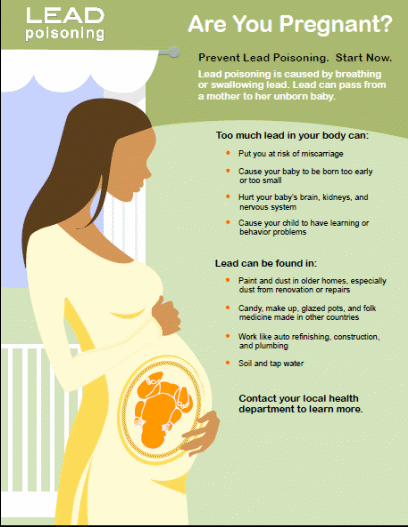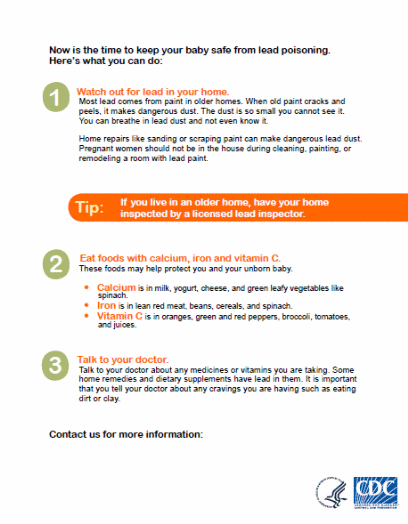Att6E_ASARCO EI_Factsheets for Letters_Oct23_2014
Att6E_ASARCO EI_Factsheets for Letters_Oct23_2014.docx
ATSDR Exposure Investigations (EIs)
Att6E_ASARCO EI_Factsheets for Letters_Oct23_2014
OMB: 0923-0048
Attachment 6E: Factsheets for Results Letters
Factsheet A: Tips for Reducing Exposure to Lead to Include with Result Letters to Participants
Flesch-Kincaid Reading level – 5.3
Things you can do reduce your family’s contact with lead
In Hayden and Winkelman, Arizona, the soil in some non-residential locations, the air, and the tailings piles have high levels of lead. There may also be lead sources in your home.
If
you or your child has a high lead level, there are things you can do
to help. Ask
your doctor to re-test you or your child’s blood for lead.
Work
together with your doctor to find the best treatment for you or
your child. Ask questions if you don’t understand something.
You
may need to: Go
to your doctor for follow up lead testing.
Test
your child for learning and developmental problems. This test is
called a “developmental assessment.” 
Avoid walking, playing, biking, riding ATVs, or other activities on tailing waste piles.
Do not trespass, climb over or go through fences and ask your family not to do so.
Pay attention to dust conditions in your community and try to avoid dust.
Find the lead in your home.
Homes built before 1978 may have lead paint. It is important to find and fix lead paint in your home as soon as possible. If you need help, contact the Arizona Department of Health Services at tel: (XXX) XXX-XXX to discuss options for getting a Healthy Homes Inspection of your home.
Don’t remodel or renovate until your home has been inspected for lead. If you can’t get a home inspection before doing home repairs, keep children and pets out of the house during the repairs, and wet mop and wet clean all dust you make. Repairs like sanding or scraping paint can make dangerous lead dust.
Clean up dust in your home.
Wet-mop floors and wet-wipe windowsills, window wells, counters, and furniture every 2-3 weeks. Avoid dry dusting and sweeping because it spreads dust into the air.
Use contact paper or duct tape to cover chipping or peeling paint.
Wash hands and toys often with soap and water. Always wash hands before eating and sleeping.
Wash pets such as dogs and cats, especially if they spend time outdoors, at least every 2-3 weeks.
Prevent dust in the first place by taking off shoes before going into your home.
Give your family healthy foods.
Feed your family healthy foods with calcium, iron, and vitamin C. These foods may help keep lead out of the body.
Calcium is in milk, yogurt, cheese, and green leafy vegetables like spinach.
Iron is in lean red meats, beans, peanut butter, and cereals.
Vitamin C is in oranges, green and red peppers, and juice.
Wash and peel all fruits, vegetables, and root crops (such as potatoes), especially any locally grown or home grown items.
Learn more. Get support.
Call NAME at the Arizona Department of Health Services if you have questions, tel: (XXX) XXX-XXXX.
Factsheet B: Tips for Reducing Exposure to Arsenic to Include with Result Letters to Participants with High Arsenic Levels
Flesch-Kincaid Reading level – 6.2
Things you can do to reduce your and your family’s contact with arsenic
In Hayden and Winkelman, Arizona the soil in some non-residential locations, the air, and the tailings piles have high levels of arsenic. There may also be arsenic in common foods you eat.
Reduce you and your family’s contact with arsenic in Hayden-Winkelman.
Avoid walking, playing, biking, riding ATVs, or other activities on tailing waste piles.
Ask your family to not trespass; don’t climb over or go through fences.
Pay attention to dust conditions in your community and try to avoid dust.
Clean up dust in your home.
Wet-mop floors and wet-wipe windowsills, window wells, counters, and furniture every 2-3 weeks. Avoid dry dusting and sweeping because it spreads dust into the air.
Use contact paper or duct tape to cover chipping or peeling paint.
Wash hands and toys often with soap and water. Hand sanitizers are unlikely to remove the arsenic.
Always wash hands before eating and sleeping.
Wash dogs at least every 2-3 weeks.
Prevent dust in the first place by taking off shoes before going into your home.
Eat a well-balanced diet
Everyone, including pregnant women, infants and children, are encouraged to eat a well-balanced diet for good nutrition.
Parents should feed children a variety of foods.
See http://www.choosemyplate.gov/ for additional information.
Limit how much you eat of foods that are known to contain arsenic.
Eat less rice. Try alternative grains such as quinoa, barley, grits/polenta, couscous or bulgur wheat.
When you prepare rice to eat, rinse it thoroughly in clean water. Boil brown rice in a lot of water (like you would do with pasta).
Vary the types of rice you eat – sometimes white rice, sometimes brown rice, sometimes Jasmine or Basmati.
Try alternatives to rice-based processed foods such as rice breakfast cereals, rice flour, rice pasta, rice cakes and rice crackers.
Limit your use of foods with large amounts of brown rice syrup.
Avoid the frequent use of rice milk in children less than 4 ½ years of age.
Learn more. Get support.
Call NAME at the Arizona Department of Health Services if you have questions, tel: (XXX) XXX-XXXX.
Factsheet C: Tips for Reducing Exposure to Lead to Include with Results Letter for Pregnant Women and Women of Childbearing Age
ATSDR plans to use the CDC lead program’s factsheet “Are You Pregnant,” available here: http://www.cdc.gov/nceh/lead/tools/Are_You_Pregnant.pdf.


| File Type | application/vnd.openxmlformats-officedocument.wordprocessingml.document |
| Author | Scruton, Karen M. (ATSDR/DCHI/SSB) |
| File Modified | 0000-00-00 |
| File Created | 2021-01-28 |
© 2026 OMB.report | Privacy Policy